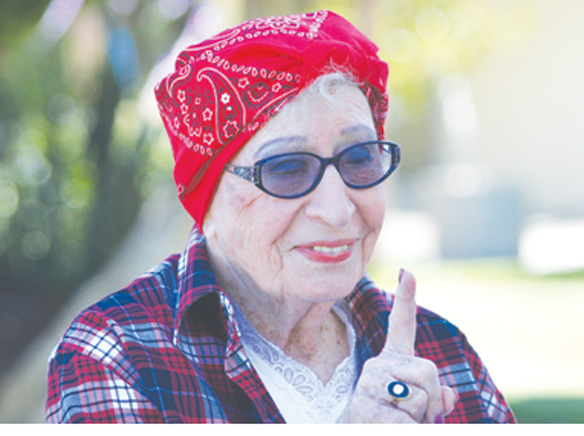By 1943, in the height of World War II, more than 310,000 women worked in the U.S. aircraft industry.
Considered one of the most successful recruitment tools in American history, the image of “Rosie the Riveter” is an icon of women’s evolution into the workforce.
With rolled up blue jeans, a plaid shirt and red bandana, one of the original Rosie the Riveters told her story at a post Memorial Day celebration at Grossmont Gardens in La Mesa.
By 1943, in the height of World War II, more than 310,000 women worked in the U.S. aircraft industry.
Considered one of the most successful recruitment tools in American history, the image of “Rosie the Riveter” is an icon of women’s evolution into the workforce.
With rolled up blue jeans, a plaid shirt and red bandana, one of the original Rosie the Riveters told her story at a post Memorial Day celebration at Grossmont Gardens in La Mesa.
Betty Rodgers, 89, came to San Diego in 1941 at the age of 17, two days after the Japanese bombed Pearl Harbor.
“On December 7, 1941 I was listening to the radio and that was when I heard Pearl Harbor was bombed,” said Rodgers. “I didn’t have any training, I didn’t know anything. My grandmother was there with me, I turned to her, and I said, ‘I’m going to San Diego. I am going to do something. So my grandmother said, ‘I’ll help you pack.’ You can take that any way you want it. Anyway, the next day I was on a Greyhound bus to California.”
She grew up in Deming, New Mexico and at 17 did not have a plan. She said in those days the only plans a girl made was getting married and having children.
With no skills, a little woman under 100 pounds and not even the ability to type, Rodgers said it was God’s working that placed her as one of the original Rosie the Riveters in history.
“I found a newspaper and I looking at it, I saw that there was a school called Casper Aeronautic, and they trained women, trying to get them into the workforce,” she said. “I went and took the course and in four weeks got a certificate. I went to Convair and they asked me what I could do. I said, ‘Here’s my certificate, I do know how to rivet.’”
Rodgers said they put her on the line with about four or five other women, she worked for two years on B-24 Bombers and other aircraft.
She said they wore rolled up jeans, a plaid shirt and had their hair up in a red bandana. She said the style, they came up with on their own, and it was practical as the bandana kept their hair from catching in the machinery, becoming the uniform they wore during the war.
“When I first went there to work, there were just a few women, but after two years it was almost all women working there,” she said.
Rodgers said as much as she wanted to tell her story, it is a difficult time to remember. Coming from Deming, she said there was one thing that bothered her that you will not find in the history books.
“By the time the war was over, it had taken the lives of nearly all the men in Deming,” she said. “There were no doctors, lawyers, pharmacists or businessmen. They were all gone.”
Rodgers married, and made her home in La Mesa. Now a widow, she said her life is still vibrant and full of opportunity and she loves the life she lives now.
Amber Coleman, healthy lifestyles director said Grossmont Gardens is very fortunate to have a very lovely lady, and is amazed at her story and happy that she is able to share it with others.
“Betty is a resident we hold very dear,” said Coleman. “She is someone that has gone out of her way to do something nice for this community.”
Coleman said Rodgers is now heading up a new program, the Grossmont Gardens Resident Ambassador Club.
“The project they are working on now is to help new residents to settle in,” said Coleman. “When residents come to Grossmont Gardens we want everyone to feel welcomed, comfortable and we know that the first little bit of time can be overwhelming and a nerve-wracking. Betty is working really hard to get people settled, especially in the dining room.”
Rodgers said that the staff at Grossmont Gardens is wonderful, but they cannot do everything.
“It’s the little things that we help with,” she said. “And it’s the little things that are important, especially when you are new.”
Kris Payne, community relations director said she “absolutely loves” the tenacity and spirit that Rodger’s brings to the Grossmont Garden residents.
“Betty’s enthusiasm and wanting to be a useful part of the community brings a vibrancy that affects every one she comes in contact with, including myself,” she said.















At this moment I am going
At this moment I am going away to do my breakfast, after having my breakfast
coming yet again to read more news. http://www.dogsitting.fr/scripts/redirect.asp?url=http://shantahomesystems.com/en/component/k2/itemlist/user/508341
At this moment I am going
At this moment I am going away to do my breakfast, after
having my breakfast coming yet again to read more news. http://www.dogsitting.fr/scripts/redirect.asp?url=http://shantahomesystems.com/en/component/k2/itemlist/user/508341
Thanks for any other
Thanks for any other informative web site.
Where else may I get that type of information written in such an ideal
means? I’ve a mission that I am just now operating on, and I
have been on the look out for such info. http://farsicad.com/download/?jubile_skin_care_957676
Thanks for any other
Thanks for any other informative web site.
Where else may I get that type of information written in such an ideal means?
I’ve a mission that I am just now operating on, and I have been on the
look out for such info. http://farsicad.com/download/?jubile_skin_care_957676